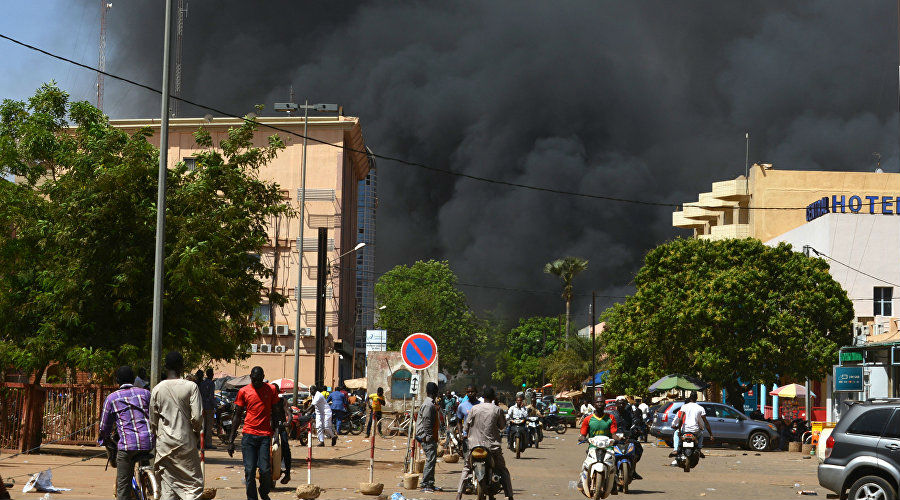Terrorist organizations operating in the Sahel and Sahara region recently escalated their attacks targeting government and diplomatic facilities. On March 2, 2018 twin attacks hit the national army headquarters, the French embassy and cultural institute in the country’s capital, Ouagadougou. Sixteen people, including eight attackers, were killed in the attacks, while 80 people were wounded.
Al-Qaeda’s affiliate Jama’at Nusrat al-Islam wal Muslimeen (JNIM) claimed responsibility for the coordinated attacks. The claim appears to be driven by a group of internal and regional changes that emerged recently. These include the international community’s increasing interest in assisting the Sahel and Sahara states in their war against terrorist organizations, and sustaining military operations carried out by world powers involved in the war on terrorism, such as France. Another driver is the increasing international warnings that Burkina Faso can become a new launching pad for terrorist organizations in the region.
Continued Operations
The recent attacks in Burkina Faso are not the first of their kind. In the past three years, Ouagadougou was hit by several attacks carried out by foreign terrorist organizations, alongside Burkinabe-based groups. Inside Burkina Faso, Ansarul Islam is one of the most active groups that rely on ethnic support. Led by Malam Ibrahim Dicko, who has become to be known as “enemy number one” for the authorities, the group is made up of militants belong to the Fula people, or Fulani, a large ethnic group in Sahel region.
To announce its existence in December 2016, the group carried out its first terror attack in Nassoumbou, in the north, killing 12 soldiers. Later, the group claimed responsibility for more attacks including two on police stations in Tongomaye and Baraboulé on January 27, 2017.
Other foreign groups loyal to al-Qaeda carried out a January 2017 attack on a hotel and a nearby restaurant in Ouagadougou that left 29 dead. Later, in August 2017, unidentified gunmen attacked a Turkish restaurant in Avenue Kwame Nkrumah in Burkina Faso's capital, killing at least 18 people of different nationalities.
What should be noted in this context is that perpetrators of some attacks, including one on two police stations in March 2017 that left three people dead, are yet to be identified. The attack coincided with kidnappings and arsons that broke out at a number of educational facilities.
Main Indicators
The concerted attacks in Ouagadougou indicate the following implications:
1- Soft Targets. Terrorist attacks carried out in Burkina Faso in the past three years, indicate that terror organizations recognize that the country is a soft target that can be used to respond to military operations carried out by other regional countries and international powers involved in defending its security and stability. An estimated 80 attacks occurred, since 2015, in Burkina Faso leaving 133 people dead.
2- Significant Timing. The recent attacks occurred a few months after a five-nation joint force in the Sahel region was announced. Member countries include troops from Mauritania, Mali, Burkina Faso, Niger and Chad. According to several views, the organizations sought to send out a message to states involved in the war on them that their attacks will be focused on targeting their interests. Of note, these attacks coincided with intensified attacks that targeted the United Nations Multidimensional Integrated Stabilization Mission in Mali (MINUSMA). The latest attack on February 28, 2018 on the peacekeeping force left four troops dead.
French interests represent a main target for terrorist organizations. A clear indication is the recent attack on the French embassy and cultural institute in Ouagadougou. Among the motives behind the attack is France’s prominent role in combating terrorism in this region, including being one of the states that called for creating the counter-terrorism G5 Sahel Force. Moreover, France deployed troops in Mauritania, Mali, Burkina Faso, Niger and Chad to back their national armies in confronting these organizations.
Following the recent escalation of terror attacks, French Minister of Armed Forces Florence Parly, in statements delivered on February 23, 2018, said that the french troops eliminated 450 terrorists since Operation Barkhane was launched in August 2014, two days after two French soldiers were killed in Mali. Parley further noted that 120 terrorists were killed in the past 12 months alone, while 150 others were handed over to Malian authorities.
Additionally, a direct connection between new and previous attacks cannot be ruled out. For instance, one day before its latest attacks in Ouagadougou, Nusrat al-Islam wal Muslimeen published a video showing French hostage Sophie Petronin, an aid worker running a charity for orphans, who was kidnapped in later 2016. Releasing the video suggests to be a prelude to the attacks that appear to be specifically targeting Paris.
3- Non-conventional Attacks. The area was targeted by the recent attacks, despite the heavy presence of security agencies protecting critical government facilities and buildings. This suggests that they were suicide attacks, and not conventional attacks. In the later, perpetrators would have escape plans in place leave the scene after the attack.
Terror organizations using this form of operations appear to be in possession of capable human elements. This indicates that these organizations have become more dangerous, and that security and political coordination among regional states and international powers involved in their crises should be elevated.
Overall, it is perhaps safe to say that a new phase in the war on terrorism is about to begin in the Sahel and Sahara region. The development would be in response to escalating threats posed by the increasing activity of terrorist organizations seeking to expand their influence and use the region as a launching pad for targeting the interests of international powers that take a special interest in achieving stability and security in this region.


